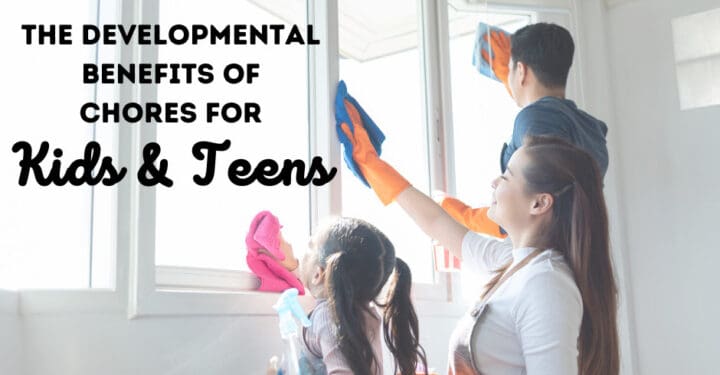
Whether your kids are preschoolers or teenagers, there are benefits to giving them chores to do around the house.
In a May 2022 research article published in the Australian Occupational Therapy Journal, “Executive Functions and Household Chores: Does Engagement in Chores Predict Children’s Cognition?” The authors stated, “The benefits of completing household chores appear to transfer beyond managing day-to-day living. It is possible that chore engagement may improve executive functions, as engagement in chores requires individuals to plan, self-regulate, switch between tasks, and remember instructions”.
Executive functions begin to develop around six years of age and continue to develop during adolescence and into adulthood. They include attention, concentration, impulse control, working memory, emotional regulation, and planning and organization, to name a few.
The article goes on to name specific executive functions that research studies have found evidence of benefitting from chores. For example, they improve impulse control (attending to tasks before playing) and working memory (remembering all the steps to complete the task). In addition, more complex chores improve planning and organization (coming up with a plan that works and is easy to follow, deciding when to start to finish on time), attention, and concentration (staying on task until the chore is completed).
In addition to improving these executive functions, chores help build self-reliance, self-confidence, and pride. Several studies have also found that children and adolescents that have consistently completed a few simple chores during the week throughout their childhood have better academically when compared to peers that did not have that experience.
Of course, tasks should be appropriate for your child’s age and development. For many duties, you’ll need to teach your child or teen how to accomplish the task and how to achieve the level of competence you expect.
Toddlers should be able to put their toys away, place clothes in the hamper, and fill up the cat or dog’s food bowl. Preschoolers can help clear the table, water flowers, and dust with a cloth. Elementary school kids should be able to sweep floors, load the dishwasher, and clean their bedrooms. By the time kids reach middle school, they should be able to wash the family car, prepare meals, and take out the trash. Finally, high schoolers can clean out the fridge, mow the lawn, and iron clothes.
In the first lesson in The Holistic Positive Parenting Course, executive functions are covered in detail. Parents learn about the developmental process of these functions and are provided with practical and easy-to-use tools and fun activities to support the development of these functions from infancy through adolescence. In the second lesson, parents learn how to create a smooth-running home, agree on house rules for conduct and responsibility, and provide encouragement and motivation. The Parent Resource Guide for the lesson includes a list of appropriate chores based on a child’s stage of development and offers simple tools to help them “stay with the program.”

